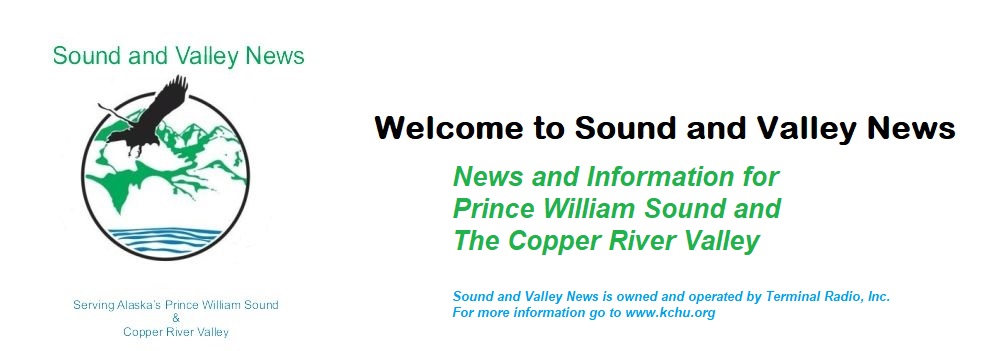
The Prince William Sound Regional Citizens’ Advisory Council will hold a board meeting in Valdez on Thursday and Friday, May 4-5, 2017.
The meeting will be located in the Valdez Civic Center, at 314 Clifton Drive.
In conjunction with the board meeting, the board of directors for the Alaska Tanker Company and the council will be co-sponsoring a public reception on Wednesday, May 3, 2017. The reception will be held from 6:00 p.m. to 8:30 p.m. at the Valdez Civic Center. The public is welcome to attend.
The tentative schedule for the Thursday session is to run from 8:30 a.m. to 5:30 p.m. On Friday, the meeting is scheduled from 8:30 a.m. to 2:45 p.m. The meeting is open to the public, except for executive sessions. Public comments are scheduled to be taken Thursday starting at 8:55 a.m.
The council will be conducting regular business during the meeting, including seating of established directors and committee members, election of new board officers, and adoption of the council budget for the year beginning July 1. Other topics included on the agenda are:
|
|
- Presentations regarding the change in Alyeska Pipeline Service Company’s marine services contract provider from Crowley Marine Services to Edison Chouest Offshore – set to take place July 1, 2018 – by Alyeska, the Alaska Department of Environmental Conservation, the U.S. Coast Guard and the council. These services include key oil spill prevention and response assets such as escort tugs, oil recovery barges and associated personnel for service in Prince William Sound.
- Consideration of a board resolution expressing support for reauthorization of the Oil Spill Liability Trust Fund excise tax, increased use of the fund for spill prevention measures and establishment of a fund balance ceiling and floor which automatically suspends and reinstates the excise tax to improve the long term sustainability of the fund. The fund is currently due to sunset at the end of 2017.
- Approval of a council-commissioned report illustrating potential improvements for the oil recovery and storage systems identified in the Prince William Sound Tanker Oil Discharge Prevention and Contingency Plan.
- A summary of the Oil Spill Surrogates Project efforts to find a safe stand-in for oil, such as wood chips, that may be used to help responders practice during oil spill response drills.
- Approval of a council-commissioned report that studied established potential places of refuge, or pre-identified sites that may aid decision-makers in responding to vessels in distress. These sites provide a sheltered location where vessels could be anchored and repaired, and/or where oil could be safely offloaded to another vessel to minimize spilled oil. Through this study, subject matter experts were interviewed and 24 ship bridge simulations of three sites were run under the operation of professional mariners using facilities at AVTEC, Alaska’s Institute of Technology maritime training center.
- Approval of two council-commissioned reports that analyze international, federal and state ballast water management policies for crude oil tankers, and an update on requirements for installation of ship-board systems designed to prevent the transport of non-native aquatic species to Prince William Sound.
The meeting agenda provided is subject to change before or during the meeting. Council board meetings are routinely recorded, and may be disseminated to the public by the council or by the news media. For more information, visit www.pwsrcac.org.
_________________
The Prince William Sound Regional Citizens’ Advisory Council, with offices in Anchorage and Valdez, is an independent non-profit corporation whose mission is to promote environmentally safe operation of the Valdez Marine Terminal and the oil tankers that use it. The council’s work is guided by the Oil Pollution Act of 1990, and its contract with Alyeska Pipeline Service Company. The council’s 18 member organizations are communities in the region affected by the 1989 Exxon Valdez oil spill, as well as aquaculture, commercial fishing, environmental, Native, recreation, and tourism groups.

